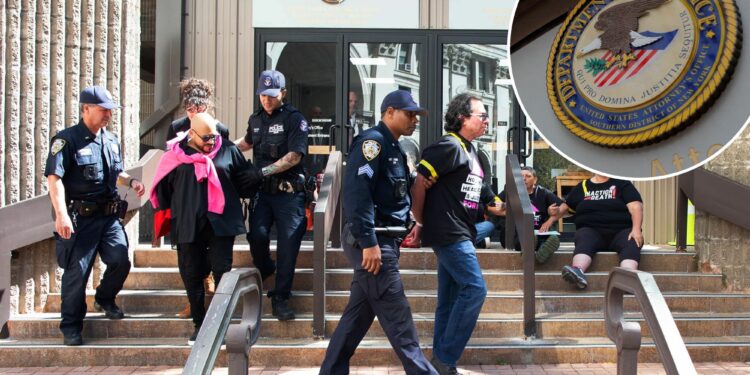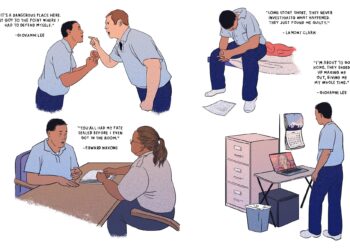
Widespread reporting paints a mostly rosy picture of receding nationwide violence and crime toward their pre-pandemic levels.
However, the effects of many policy reforms since 2020 not only mask rising crime rates, but degrade the criminal justice system’s ability to provide justice to victims.
A perfect example of these shifting mechanisms is New York state’s 2020 “discovery reform” legislation, which forces prosecutors to reallocate their time around crippling burdens for evidence collection.
The state’s 62 district attorneys’ offices must now amass — for every case — material that often has little to do with guilt, equity, or justice.
And as newly released data confirm, this overwhelming compliance obligation is preventing prosecutors from doing their jobs.
The findings are clear: More than a quarter of all cases that passed through Manhattan criminal court during the first 11 months of 2023 were automatically dismissed because overburdened prosecutors ran out of time to pursue them.
Some 8,000 cases in total were automatically dismissed in 2023, a huge increase from the mere 3% in 2019.
These cases are not trivial.
They include not-yet-indicted felonies, as well as serious misdemeanors such as stranger assaults, most domestic violence crimes, and forcible touching on the subway.
Indeed, by swamping prosecutors with evidence collection for its own sake — rather than for achieving fairer outcomes — reformers have undercut justice system-wide.
The prosecutorial triage caused by discovery reform also made 2023 a record-high for downgrading Manhattan felony arrests to misdemeanors.
In 2019, prosecutors downgraded 39% of felony arrests to misdemeanors; last year it was 54%. And for felony property crimes, the rate nearly doubled from 24% in 2019 to a record-high 46% property-crime felonies downgraded to misdemeanors last year.
The astonishing frequency of case dismissals and downgrades tells only half the story.
Equally worrisome are the legions of swamped assistant district attorneys (ADAs) who are simply declining to prosecute cases at record rates.
In Manhattan, for instance, there was a 91% increase in declined felony cases last year compared to 2019.
While this does not affect the most heinous crimes, like homicide, ADAs declined to prosecute twice as many thefts and 243% more burglaries in 2023 compared to before discovery reform.
Weapons declinations rose 189%, resisting arrest by 706%.
In other words, prosecutors have radically shifted how they allocate their time and this is impacting public safety.
Imagine a persistent shoplifter.
He raids stores, daily, to support his drug addiction.
Cops arrest the culprit, connecting him to 10 recent incidents using surveillance footage.
They charge him with one robbery, four grand larcenies, and five petit larcenies.
But here’s the shift: In order to prosecute all of these cases, discovery laws now dictate that ADAs collect and share with defense counsel every bit of evidence, no matter how meaningless, from every charge — from redundant surveillance videos to statements from witnesses who saw nothing.
So, time-constrained prosecutors choose only to charge the thief with three grand larcenies and decline the rest.
Is this just? Of course not.
It also leads to more crime.
With zero follow-up provided to the seven stores whose cases were declined, owners assume no arrests or prosecution resulted from their complaints.
Now their employees have even less incentive to report future thefts.
Similarly, police officers’ demoralization rises by making arrests that ultimately go nowhere.
Further, the seven declined cases won’t be included in statewide Office of Court Administration records, which only tally prosecuted crimes.
Thus, the data will portray fewer crimes than have actually occurred, resulting in a skewed story of public safety.
Worse, criminals are incentivized to continue stealing — with justice served more arbitrarily based on which ADAs have bandwidth.
For many repeat offenders, the ultimate endpoint is still incarceration.
But the process to get them there is now belabored and more hazardous. Little wonder 61% of New Yorkers fear becoming crime victims despite decreasing murders and shootings.
The 2023 data jarringly underscore the damage done when prosecutors are forced to prioritize work that has no bearing on justice over work that does.
New York should amend its discovery statute to only require the collection of substantive evidence before moving a case forward.
And nationwide, we should embrace more nuanced policymaking, acknowledging that criminal justice mechanisms are complex, and we need our police and prosecutors’ time prioritized toward pursuing real-life safety measures.
Hannah E. Meyers is a fellow and director of policing and public safety at the Manhattan Institute.



























